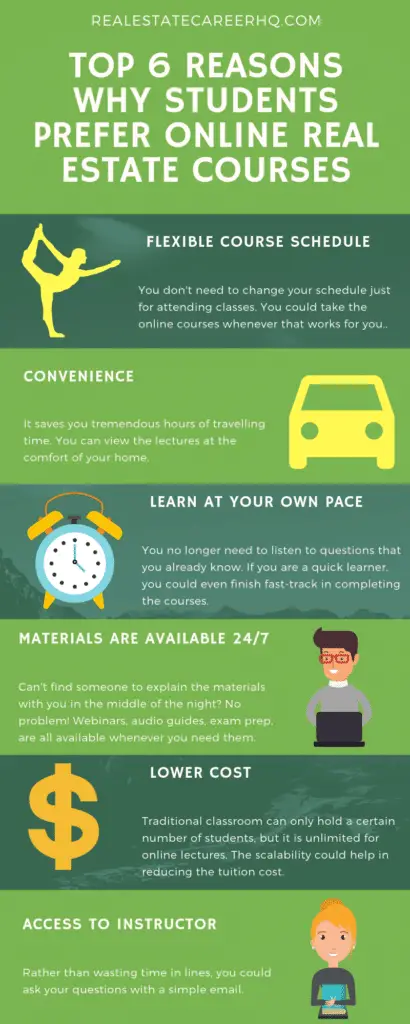(**) Disclosure: This post may contain affiliate links, meaning RealEstateCareerHQ.com will get a commission if you decide to make a purchase through the links, but at no additional cost to you.
So you are considering to become a real estate agent? That’s great.
Throughout the years, I have met many real estate professionals through networking and personal connections. I always wonder what are the requirements to obtain a real estate license and what do they like about the career.
I have the opportunity to have an in-depth conversation with many of them. They enjoy the real estate career because it allows them to manage their working hours and have the flexibility to conduct the business in ways they want. Rather than staying at the same boring office environment every day, they get to work with many interesting properties and clients.
According to the Bureau of Labour Statistics, there are over 348,800 real estate agents in the U.S. and the projected growth between 2016 to 2026 is 5.8%.
Unlike other professions such as lawyer or doctor, you don’t need a doctoral degree to be successful in the real estate industry. Your income potential is enormous, and it totally depends on the effort and time you put into the business.
[Read: Complete Guide on Real Estate Agent Salary]
How to become a real estate agent? To become a real estate agent, you’ll need to complete the pre-licensing courses, pass the exam, register with the state commission, and work with a sponsoring brokerage.
Since you are reading this article, I know that you must be interested to know more about being a real estate agent. Below are some researches I have done, and I’d love to share them with you. In this post, you will find the step-by-step procedure to obtain a real estate license, the essential tools to run a real estate business and other common questions about this profession.
10 Steps to Become a Real Estate Agent

Step 1: Find out the State License Requirement
Although the licensing requirement is similar across different states, there could be some variation in between. Each state has its own Real Estate Commission, and this is the regulatory agency responsible for issuing real estate licenses.
However, I found that many states would require you to fulfill the following basic requirements:
- At least 18 years old
- Hold a high school diploma
- Have valid Social Security Number
- US Citizen or lawfully admitted alien
By the way, the details I’m going to share are just for general understanding. Since the licensing requirement varies across different states (i.e., license fee, application procedure, exam format), you should check with your state real estate commission.
[Read: Real estate licensing requirement in different states]
Step 2: Search for a Real Estate School
One of the requirements is to complete the pre-licensing real estate courses from an approved education provider. Before you search for a school, you should confirm whether your state allows distance education. At the time I’m writing this article, the following states do not recognize online credits – Arizona, Connecticut, Delaware, Idaho, New Jersey, North Carolina, Rhode Island, South Carolina, and Washington.
Many students prefer taking online lectures over a traditional classroom setting.

But don’t just choose any online real estate school. You should select one that has extensive teaching experience, with tremendous positive feedback from students, and have the tools to help you study effectively.
You should find a trusted school that is accredited by The Association of Real Estate License Law Officials (ARELLO) and International Distance Education Certification Center (IDECC). This ensures that the school is meeting a high standard in providing real estate classes.
When choosing a real estate school, I prefer one where you could take the courses online. This way, you could study at your own pace whenever and wherever. The Colibri Real Estate is a trustworthy real estate education provider. You may click here to see whether they offer pre-licensing course in your state. (**)
Step 3: Complete the Pre-Licensing Courses

If you enrol to a traditional classroom program, you need to attend classes according to the preset schedule. On the other hand, if you register with the online courses, then you could study according to your own pace. However, don’t cram up studying all the materials right before the course expiry date. Develop a good habit and set aside 45 minutes to 1 hour of studying time every day.
The earlier you finish the study, the earlier you could move to the next stage of obtaining the real estate license.
The amount of required course work varies among different states. For instance, you would need to take 180 hours of pre-licensing courses in Texas, but only 63 hours in Florida.
Step 4: Register for the Real Estate Exam
You need to register with a third-party exam administer. They are typically either PSI or Pearson-Vue. Depending on your state, some allow you to register online, while others still require you to submit a paper application. But regardless of the method of submission, you would need to provide:
- Application form
- Exam fee (approximately $35 to $60)
- Transcript of the completion of the pre-licensing courses
Step 5: Prepare for the Exam

The real estate exam is to test your knowledge on different real estates concepts such as property ownership, land use controls and regulations, valuation and market analysis, financing, general principles of agency, property disclosures, contracts, and others. They mostly consist of the two key sections which are the “National Portion” and the “State Portion” and are in multiple choices format. The required passing score is usually 70%, where you would have around 150-180 minutes to complete it.
Rather than blindly memorizing all the course materials, you should focus on the subjects that are most likely to be tested. Exam preps could help you in identifying those areas and familiarize with the exam questions. I found a couple of exam preps which could be helpful to you. You could find them on our resource page.
Step 6: Write the Real Estate Exam

At the day of the exam, make sure you prepare all the essential items to the testing center. Most exam administrators require you to bring two pieces of government ID. (i.e., Driver license, passport), but at least one must be a photo ID. Since they are a computerized exam, you would know the result immediately.
[Read: How to Pass a Real Estate Exam in 4 Simple Steps?]
Step 7: Submit Application to the Real Estate Commission
After you pass the real estate exam, you must register with the state real estate commission within a particular timeframe. For example, you’ll need to do so within three years of passing the exam in Pennsylvania, or else you would need to retake the exam.
To streamline the process, most states allow you to apply online through their website. In addition to the application, you will need to provide the following:
- License fee (About $100 to $200)
- Supporting legal documents
- Transcripts or course completion certificates of the pre-licensing education
- Electronic fingerprints for background check purpose (About $50)
Step 8: Find a Real Estate Brokerage

After the state commission accepts your application, they would issue you with a real estate license. However, it will remain inactive until you can find a sponsoring real estate brokerage. Typically speaking, you would have one year to do so.
If you have not made any prior arrangement, now it’s the time to visit some real estate brokerages. You could begin by contacting the real estate offices in the region that you wish to specialize in. Explain to them that you just had your license, and find out if their brokerage works with new agents. Of course, don’t just join any brokerage that comes along. You need to find out whether they are a good fit for you or not. Here are some questions you could ask them during the interview:
- Will they assign you with a designated mentor?
- Do they provide leads to agents?
- Is there any marketing support? (i.e., website, social media)
- What is the commission split?
- Is there a desk fee?
- Any other costs? (i.e., franchise fee)
- Do they have any specialty? (i.e., commercial? Distressed? foreclosure?)
Be honest, but humble during the discussion. You should find out their expectation toward new agents and let them aware of the support you’ll need from their office.
Step 9: Complete the Post-Licensing Courses and Continuing Education
Your learning does not stop after you obtain the real estate license. To ensure you are keeping up to date with the current laws and regulations,
some states would require you to complete specific hours of post-licensing courses before the first renewal date of your license. Then for subsequent renewals, you only need to take the continuing education classes.
For example, the Ohio Division of Real Estate would require you to complete 20 hours of post-licensing courses before the license renewal. Then take 30 hours of continuing education courses for subsequent renewals.
Step 10: Renew the Real Estate License
Depending on which states you are running your real estate business, most State Commissions require you to renew the license every 1 to 3 years. You just need to submit the application along with the renewal fee.
Sometimes, the Real Estate Commission could request proof that you have fulfilled the post-licensing and continuing education requirement. For audit purposes, you should maintain the course completion certificates for at least 6 years.
How Much does it Cost to Become a Real Estate Agent?
I checked with the pre-licensing courses from an education provider. Depending on which state you are located and the program you are enrolling in, the tuition typically is under $500. Then it would cost about $100 for the exam fee, and $200 for the license fee. Therefore, it could cost around $800 to $1,200 to become a real estate agent.
Also, you may want to invest in exam prep. It can increase your chance of passing the exam on the first try so that you don’t need to waste time and money in retaking it.
PrepAgent is an exam prep that I highly recommend. Many students were able to pass the real estate exam after doing their practice questions. Over 97% of users provided a 5 out of 5 stars rating to them on Facebook. Click here to check out their package options. (**)
How Long does it Take to Become a Real Estate Agent?
It could take you one to two months to finish the pre-licensing course, and another month to master the study materials and all the exam prep questions.
If you submit the application right after you pass the exam, then it could take the Licensing Commission a few weeks of processing time. Therefore, in total, it could take 3 to 4 months to get a real estate license.
Can You Get a Real Estate License with a Felony?

All Real Estate Licensing Board will put into consideration the applicant’s honesty, trustworthiness, character, and integrity. Whether a felon can be a real estate agent is subjected to how the licensing commission evaluates the case.
Depending on the severity of the conviction, they may require you to wait for a period (i.e., 2, 5, or even 10 years) before applying for a real estate license. In some extreme cases, they could completely decline your application. Therefore, it is wise to get a preliminary consultation with the Licensing Board before you invest too much time and money into getting the license.
But don’t get discouraged as everyone has a past. The most important is that you can demonstrate that you will serve the public in a fair, honest, and open manner.
Here’s an article that covers how to apply for a real estate license with a felony record. In there, you’ll find practical tips which could help your application.
Is a Real Estate License Transferable to Another State?
Some states have a reciprocity agreement with others. If you are already holding an active real estate license, some states may allow you to apply through reciprocity.
In such a scenario, they usually could waive the pre-licensing education requirement. (Although some states such as Alabama still require you to take pre-licensing courses, the amount of course work is a lot less than non-license holder). Also, you still need to pass the real estate exam, but only the state portion.
How to Become a Commercial Real Estate Agent?

To become a commercial real estate agent in Alabama, you need to complete the same set of pre-licensing real estate courses and pass the real estate salesperson exam.
Most states do not issue separate licenses for residential and commercial agents. So, the requirement is basically the same one we just went through.
Furthermore, if you are going to pursue a career as a CRE agent, you should look for a brokerage that could give you the right support and resources.
Here’s the “Complete Guide to a Commercial Real Estate Agent Career“, where I cover the career outlook, earning potential, and valuable feedback from CRE agents. Be sure to check it out.
Check out these Essential Tools to Run Your Real Estate Practice

We just went through the administrative steps in becoming a real state agent. However, being a real estate sales associate is a lot more than just getting a license. Unlike other brick and mortar businesses, although you would not have any inventory, there are many essential tools you would need.
Car – Ease of Transportation
As much as I want to be environmentally friendly, walking or biking do not seem to work in this profession. There would be days where you need to travel from houses to houses. If you are bringing clients to view properties, some clients could be unfamiliar with the neighborhood. Therefore, you might need to drive them around.
If purchasing a car is out of your budget, then consider leasing one at first. You don’t need to lease a top model car, but make sure to keep both the interior and exterior clean and neat.
Software and Apps – Streamline Your Process
As we are moving into a digital world, there are many tools you could use to streamline the process of servicing your clients. Below are a few that we like:
- Skype/Google Hangout: Host online meetings
- DocuSign: It allows your clients to sign the documents with their smartphone or tablet
- Genius Scan & Fax: Rather than using a huge and expensive machine, all you need is a smartphone to scan and fax your documents.
You could also use a secured cloud base to transfer documents to your client. If you are going to send client-sensitive info through emails, make sure to use an encrypted solution. You can check Hushmail.com.
MLS Subscription
MLS is one of the crucial tools for real estate agents. This online platform allows you to see properties listings and also list your client’s home for other salespeople to see. Some brokers would cover the MLS fees to attact agents.
If you are a REALTOR, (which is a member of the National Association of REALTORS), then you should be able to access MLS through the membership benefits.
[Read: Difference Between Real Estate Agents and REALTOR]
Client Relationship Management System (CRM)

As your client base continues to expand, you can’t just rely on your memory in performing day to day activities. In fact, as a successful business person, you should automate the process as much as possible. A good CRM allows you to enter information about your clients, automatically send out greeting and reminders to clients on important dates. It also should have the features for you to keep track of the process and to-do-list of a deal.
[Bonus] Career Tips
1. Have Six Months of Savings
Real estate indeed could be a lucrative career. But it is definitely not a get-rich-quick scheme. It takes time to build up a trusted relationship with potential clients. Most real estate agents would take years in developing a solid client base.
In other words, you might not see significant income in the first couple of years. Without any backup savings, financial stress could lead you to quit the real estate career.
Some new agents are uncomfortable without any predictable income source. Therefore, in the early phase of their real estate career, they would work as a part-time agent while keeping another job.
2. Join Real Estate Industry Affiliations
Although you can enhance your knowledge through taking courses, there are many skill set that cannot be learned from a textbook. When you connect with other real estate agents and brokers, you can benefit from their first-hand experience in how they run their business.
In addition, you can build your referral network with other real estate professionals such as real estate appraiser, mortgage agent, home inspector, real estate lawyer, and many others.
If you are reading up to this point, I bet you must be interested in getting a real estate license. Your first step is to complete the pre-licensing courses. You should select one that has an excellent reputation and long-term track record of satisfying students. The Colibri is exactly that! You may click here to check it out yourself. (**)
The Bottom Line
Being a real estate agent could be a rewarding career. To obtain the real estate license, you’ll need to complete the pre-licensing courses, pass the exam, and register with the Real Estate Commission in your state.
However, this is only the first step in becoming a real estate salesperson. There are many other preparations involved. We just went over some essential tools to run a real estate business, but there are many others that I have not yet covered — for instance, having office space for client meetings, business cards, the tools for real estate marketing, a system to generate leads, or even proper business attire.
Even though the bar to obtain a real estate license is not extremely high, there is no fluke in this business. Your question should not stay as “How to become a real estate agent?”. Instead, it should be how to become a successful one. Here are 30 tips in becoming a successful real estate agent.
I hope you find this article helpful. If you do, please share it.
Looking to succeed in the real estate industry? Subscribe to our exclusive email list today and gain access to expertly curated real estate guides from industry leaders, as well as discounted CE courses and the latest industry updates. From marketing strategies to virtual staging techniques, our handpicked resources cover everything you need to know to stay ahead of the game. Click here for more details!
(**) Affiliate Disclosure: Please note that some of the links above are affiliate links, and at no additional cost to you. Our company, JCHQ Publishing will earn a commission if you decide to make a purchase after clicking on the link. Please understand that we include them based on our experience or the research on these companies or products, and we recommend them because they are helpful and useful, not because of the small commissions we make if you decide to buy something through the links. Please do not spend any money on these products unless you feel you need them or that they will help you achieve your goals.
Disclaimer: The information in this post is for general information only, and not intend to provide any advice. They are subjected to change any notice, and not guaranteed to be error-free. For full and exact details, please contact your real estate broker/ the regulatory commission in your state/ or the associated company and organization.
Reference:

